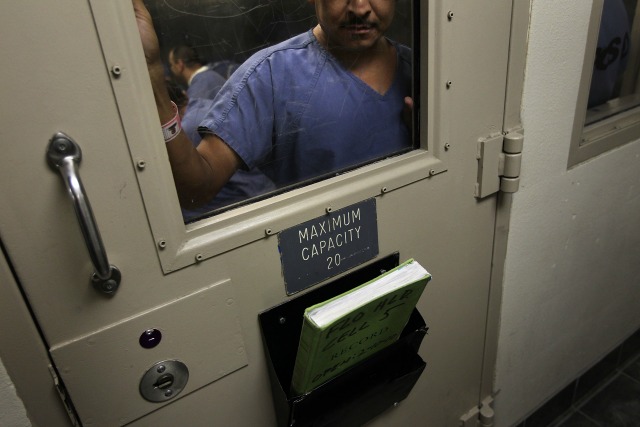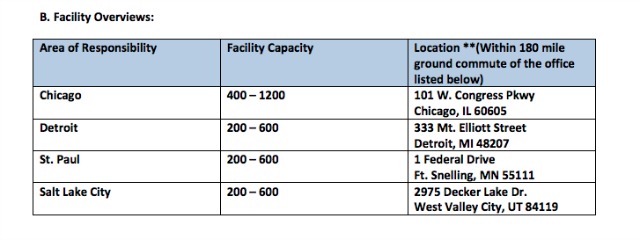Trump Administration Is Scouting For An Immigration Detention Site In Chicago Area
By Stephen Gossett in News on Oct 18, 2017 5:21PM

An immigrant stands in a holding cell at the U.S. Immigration and Customs Enforcement (ICE) detention facility for illegal immigrants on July 30, 2010 in Florence, Arizona. (Photo by John Moore/Getty Images)
The Immigration and Customs Enforcement (ICE) agency earlier this month put forth requests to identify possible new immigration detention sites in multiple cities, including the Chicago area.
As reported by USA Today, notices appeared on a federal contracting website issuing Requests for Information to pinpoint potential sites in Chicago, Detroit, St. Paul, Salt Lake City and Texas.
"Dedicated ICE facilities are preferred, but facilities shared with other detained populations will be considered as long as appropriate separation of ICE detainees is possible. The ideal facility or facilities will provide minimum, medium and maximum security beds for adult detainees (male and female)," ICE wrote.
ICE's Request for Information seeks info for a facility that could house between 400 and 1200 detainees and would be within 180 miles of ICE's Chicago field office (101 W. Congress Pkwy).

Request for Information - Immigration and Customs Enforcement (ICE) - Immigration Detention Services - Multiple Areas of Responsibility (Chicago, Detroit, St. Paul, and Salt Lake City)
Other characteristics identified in ICE's overview include having an approximate 30-minute distance from a hospital and a roughly 90-minute commute to an ICE Air Operations Unit approved airport. Potential detention sites could "serve as a transportation hub for picking up and dropping off ICE detainees," according to the RFI.
ICE is collecting responses through 1 p.m. on Oct. 26, according to the notice.
An ICE official stressed that the RFI is an information-gathering procedure and the agency had not yet issued any Requests for Proposal, meaning as of yet there are no requests to build or move into existing facilities, and such a potential call is far from solidified. "[N]o contract will directly result from the postings," the official told Chicagoist via email.
"U.S. Immigration and Customs Enforcement's (ICE) Office of Acquisition Management and the Enforcement and Removals Operations regularly conduct market research for the acquisition approach to re-compete current contracts or add new ones," the official said. "The agency is soliciting feedback to identify potentially interested vendors, the potential location(s), and type(s) of facilities that may be proposed should a Request for Proposals be competed."
The official noted that Congress was asked to consider an increase of $1.24 billion "in funding for detention beds, which would support an average adult daily population of over 48,000" for ICE's fiscal year 2018, per President Trump's budget request.
ICE declined to comment when asked if the agency had received any Chicago-area submissions.
According to the agency's website, ICE currently has three detention facilities in Illinois, including the McHenry County Adult Correctional Facility, northwest of Chicago.
According to the Washington Post, as of September 9, the Trump administration had deported fewer people nationwide (211,068) than the Obama administration had at around the same time in 2016 (240,255), even though arrests by ICE agents spiked by 43 percent compared to that time last year.
Jessica Vaughan, director of policy studies at the Center for Immigration Studies, pointed out to USA Today that four of the cities listed in the RFI are "sanctuary cities," though there was no indication from the agency that that played a role in the choice of sites.
Chicago remains tangled in a legal battle over its sanctuary-city policies with the Department of Justice. A judge last Friday refused to alter his nationwide injunction that prevents the DOJ from withholding federal grants to cities where local law enforcements do not cooperate with federal immigration agents to the degree that the Trump administration desires.